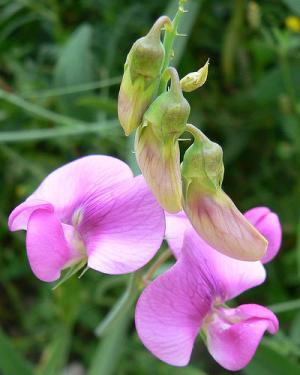Sweet Pea

While all members of the genus Lathyrus [ Lathyrus sativus (Chickling pea), L. odoratus (sweet pea), L. latifolius (Perennial sweet pea), L. sylvestris (flat pea), L. hirsutus (Rough Pea) ] are considered toxic, the effects of the toxins tend to be more cumulative than immediate. Additionally the majority of the toxin seems to be relegated to the mature seeds (peas) of the plant. Based on the available research data this plant would pose the greatest threat to animals when either due to a lack of other food resources or due to their proximity to grazing animals, the plant becomes a significant portion or long term staple of the animals diet. In non naturally grazing animals like dogs and cats, serious neurological damage from long term or repeated ingestion is not likely and the typical reaction tends to be more immediate presenting as would be expected from an animal that had just eaten something disagreeable; GI upset, vomiting, diarrhea and possibly lethargy.
In horses and other grazing animals the effects of the toxin build over time and can be quite devastating resulting in tissue damage to internal organs, convulsions, paralysis, skeletal deformity, birth defects, aortic rupture due to defective synthesis of cartilage and connective tissue, and death. Symptoms typically begin to appear when the seeds have become a major part of the animals diet (25% or more) due to lack of other food resources or the plants proximity to frequently used grazing lands for a period of days or weeks.
The toxin is believed to damage the body in two ways, first by decreasing collagen synthesis, thereby restricting the body’s ability to heal muscles, tendons and other fibrous tissue; and by speeding up the process of cell death in tendons and other connective tissues like those found in the heart.
In dogs and cats, the odds of long term or repeated consumption are unlikely as GI upset would dissuade them from making it a regular part of their diet. In horses and other grazing animals the prognosis is going to depend entirely of how much and how long they have been grazing upon the plant. Animals “may” slowly recover if they prevented from further ingestion of the plant before neuronal degeneration or cellular damage is severe. If the animal is already in the stages of advanced decline due to long term ingestion of the plant then unfortunately the damage has already been done and a full recovery is unlikely. Prevent further ingestion of the plant, Consult your veterinarian.




